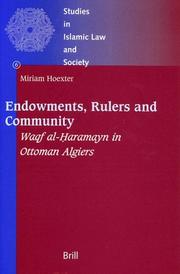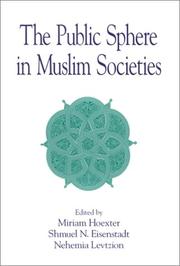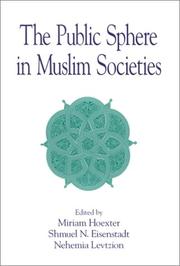| Listing 1 - 4 of 4 |
Sort by
|

ISBN: 9004660119 9004109641 Year: 1998 Publisher: Leiden : BRILL,
Abstract | Keywords | Export | Availability | Bookmark
 Loading...
Loading...Choose an application
- Reference Manager
- EndNote
- RefWorks (Direct export to RefWorks)
By the time the French entered Algiers, the Haramayn was by far the largest public foundation in town. Administering not only the endowments for the benefits of the poor of the "haramayn"--The two Holy Cities of Islam - but also endowments for the four mosques and a group of endowments for the poor of Algiers, the Haramayn controlled close to 1750 properties. The development of this important institution, which was virtually non-existent some 200 years earlier, its expansion, its administration, the evolution of its patrimony, its policies concerning the management of its assets and its various functions, are all discussed in this study, against a background of the history of the town of Algiers. Highlighting legal, social, economic and political aspects of the waaf institution, this book should be of interest to historians of the Ottoman Empire, and Ottoman Algeria in particular, as well as social and economic historians of the pre-modern period.

ISBN: 0791453685 Year: 2002 Publisher: Albany : State University of New York Press,
Abstract | Keywords | Export | Availability | Bookmark
 Loading...
Loading...Choose an application
- Reference Manager
- EndNote
- RefWorks (Direct export to RefWorks)
Islam and state --- Islam and justice --- Sociology, Islamic --- Islam --- -#SBIB:031.IO --- #SBIB:321H91 --- #SBIB:316.331H300 --- Mohammedanism --- Muhammadanism --- Muslimism --- Mussulmanism --- Religions --- Muslims --- Muslim sociology --- Sociology --- Justice and Islam --- Justice --- Mosque and state --- State and Islam --- State, The --- Ummah (Islam) --- Essence, genius, nature --- Niet-specifieke politieke en sociale theorieën vanaf de 19e eeuw: islam, Arabisch nationalisme --- Godsdienst en samenleving: algemeen --- Islam and justice. --- Islam and state. --- Islamic sociology. --- Essence, genius, nature. --- Islamic sociology --- #SBIB:031.IO --- Islam et etat --- Islam et justice --- Sociologie de l'islam

ISBN: 0791488616 0585476101 9780585476100 0791453677 9780791453674 0791453685 9780791453681 9780791488614 9780791488614 Year: 2002 Publisher: Albany State University of New York Press
Abstract | Keywords | Export | Availability | Bookmark
 Loading...
Loading...Choose an application
- Reference Manager
- EndNote
- RefWorks (Direct export to RefWorks)
Challenging conventional assumptions, the contributors to this interdisciplinary volume argue that premodern Muslim societies had diverse and changing varieties of public spheres, constructed according to premises different from those of Western societies. The public sphere, conceptualized as a separate and autonomous sphere between the official and private, is used to shed new light on familiar topics in Islamic history, such as the role of the shari`a (Islamic religious law), the `ulama' (Islamic scholars), schools of law, Sufi brotherhoods, the Islamic endowment institution, and the relationship between power and culture, rulers and community, from the ninth to twentieth centuries.
Islam --- Islamic sociology. --- Islam and justice. --- Islam and state. --- Muslim sociology --- Sociology, Islamic --- Sociology --- Mosque and state --- State and Islam --- State, The --- Ummah (Islam) --- Justice and Islam --- Justice --- Essence, genius, nature.
Digital

ISBN: 9783050048482 9783050041599 Year: 2009 Publisher: Berlin Akademie Verlag
Abstract | Keywords | Export | Availability | Bookmark
 Loading...
Loading...Choose an application
- Reference Manager
- EndNote
- RefWorks (Direct export to RefWorks)
| Listing 1 - 4 of 4 |
Sort by
|

 Search
Search Feedback
Feedback About UniCat
About UniCat  Help
Help News
News